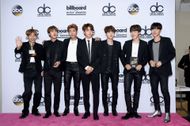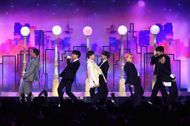BTS, also known as Bangtan Sonyeondan or Beyond The Scene, was formed in 2013 in Seoul, South Korea. BTS's ascendancy was not merely about topping charts or selling out venues to capacity, its impact registered a paradigm shift in the culture of how young people across the globe consume music and culture.
From South Korea's ultra-disciplined idol system, the group emerged gradually beyond national boundaries by establishing a real connection with the audience through unabashed storytelling, emotional authenticity, and socially aware content.
Instead of following the norms of the Western music industry, they recharted the terrain so that Korean culture and language took center stage in mainstream pop. Their success contradicted the notion that language is a deterrent to music and showed that authenticity, when coupled with innovation and intent, can travel anywhere.

BTS's path is one of more than individual success; it is a path towards wider acceptance, cross-cultural understanding, and the unifying power of music. What distinguishes BTS in the international music scene isn't merely their chart-topping or sold-out arenas; it's how they've remade what it is to connect through music in the 21st century.
Influenced by South Korea's ruthless idol system, the seven artists: RM, Jin, Suga, J-Hope, Jimin, V, and Jungkook, took nascent buzz and turned it into a global phenomenon based on authenticity. Instead of merely depending on sleek imagery or hooky hooks, they've constructed a cultural bridge through emotional vulnerability, never afraid to tackle issues such as identity, mental illness, and cultural expectation.
This unapologetic boldness, coupled with genre-bending beats and authoritative performances, has created a devoted worldwide constituency not bound by language or geography, demonstrating that authentic storytelling can cross borders and reach all the corners of the world.
The rise of BTS
BTS, whose seven members were put together by Big Hit Entertainment in 2013, did not simply emerge as the next K-pop group; they remade what global pop stardom would be like in the 21st century.
Grounded in hip-hop, their early discography was rough and raucous in a way that set them apart from more polished idol groups. But what really launched them into international stardom was that they just continued to grow as artists and people.
Rather than trend-hopping, they created a discography that spoke to incredibly personal and timely social concerns, everything from mental health struggles and identity crises to the pressure placed on young people in an over-competitive culture. Those subject matters, the norm in alternative pop but never in mainstream, were pillars of their work, challenging listeners to listen, ponder, connect, and heal.

Another part of why BTS became a cultural phenomenon is that they dismantled the conventional framework between artist and listener. Using sites like Twitter, VLive, and subsequently Weverse, they established a dialogue with their fans, not infrequently letting them see life, thoughts, and process through unfiltered images.
This exposure provided a sense of closeness that few fans didn't even realize they could have with global celebrities, turning ARMY into a global phenomenon instead of simply a fan club.
BTS did not require the Western media gatekeepers' stamp of approval, instead, they took matters into their own hands, fueled by digital technology, diligence, and an intensely passionate fan base.

With their career rising, the awards followed. From historic wins on the top U.S. music award programs to having multiple No. 1 singles on the Billboard Hot 100, BTS shattered the belief that language could potentially hinder success globally.
But behind the numbers and achievements, BTS's legacy is that they can get tens of millions to fall in love with who they actually are, challenge what is possible and what is acceptable, and dream big.
In a time when fame can be fleeting and manufactured, BTS is a lesson in how authenticity, vision, and interconnectedness through the internet can come together to create a new paradigm of popular music.
Their impact isn't just measurable in bulk, but in the intensity of the feeling in their music and the cultural dialogue they've established. As artists, as activists, as cultural emissaries, BTS continues to redefine what it means to be a global phenomenon, setting the bar not only for K-pop but for the music industry at large.
Read More: 12 most popular BTS songs that took the world by storm
How BTS blends music and message to inspire a global audience
Rather than being bound by their cultural heritage, BTS is an energetic fusion of musical cultures that overstep nationality and genre lines. Their music is not restricted by the rules of K-pop; rather, they are a multicultural fabric of influences ranging from American R&B and hip-hop to alternative rock and electronica.
Every member has a distinctive musical background rooted in personal experiences, infused with Korean and Western art, creating the group's genre-bending identity.
Apart from their musical eclecticism, BTS has also been praised for their introspective and socially aware lyrics that explore themes of identity, mental health, and social pressure; themes poorly served by mainstream pop. Their integrity and capacity to discuss challenging topics have assisted in creating a global fan base around shared values rather than language.

As cultural diplomats, BTS has been a prime force behind Hallyu globalization, inviting worldwide audiences to become engaged in Korean culture on deeper levels. Their success not only set the standard for what a global pop group is but has also transcended decades-long limits of Asian representation globally.
Whether with their record-breaking tunes or highly personal narratives, BTS continues to inspire a redrawing of what modern music and modern identity can achieve.
Read More: Top 10 'The Beatles' songs that still echo through time
The impact of social media power
BTS's ascension to international superstardom has been inexorably tied to their use of social media as a strategic asset, one that has been at the center of the formation of their international identity. By forging a powerful, instant connection with their followers on Twitter, Instagram, and TikTok, the group has established a devoted and committed fan base.
This direct interaction has not only allowed the boy band to reach a massive fan base but has also revolutionized the way artists engage with fans, demonstrating the omnipresent influence of digital media in contemporary music culture.
ARMY, the fan base of BTS, is evidence of this virtual connection in that it is not only evident on the musical side but also by shared participation in all forms of social activities and campaigns the group engages in.

Through live streaming, backstage updates, and direct contact, BTS has created an interactive and engaging place that enhances their connection with their fans. These virtual sites of meeting, such as posts on Weverse and Twitter, fan gatherings, and live sessions, have created a sense of belongingness and empowerment in this virtual and global society.
They show us how BTS has structured the virtual space into their method of creating an ecosystem in which individuality and reinforcement of the community go hand in hand happily.
Read More: 8 Post Malone songs that defined a generation
Groundbreaking collaborations of BTS
BTS's cross-cultural collaboration with the artists of the west, as reflected in their work on Butter with Megan Thee Stallion, is a testament to the group's effort to unify different musical worlds. Not only do these projects enable them to gain access to an even greater international fan base, but they also enable the association between Eastern and Western music, making pop culture a more globalized and common experience.
Their work, be it when they're collaborating with international legends or individual performances, shows the extent to which they've transcended, from being a K-pop group, to become a cultural phenomenon. Such pairings introduce new inspirations, challenging the group's imagination, thus sparking innovation that allows them to reach out to different kinds of listeners.
Joint efforts with influential musicians, for example, with Halsey on Boy With Luv or Coldplay on My Universe, are the optimum expressions of merging different genres and acquiring new fans.

By initiating collaborations with other top global artists, BTS keeps pace with the evolving landscape of global music, demonstrating their adaptability and pushing artistic boundaries. Such collaborations often become huge hits, cementing them as global stars.
Besides musical blending, these collaborations are also an affirmation of BTS's universal message that allows them to reach listeners who belong to varying walks of life and cultures. This universality not only diversified their music but also welcomed fresh fans to listen to their whole body of work, making them an international phenomenon.
Read More: 10 Freddie Mercury tracks that still set the stage on fire
Breaking records with their songs, awards, and recognitions
BTS's triumph on the major award ceremonies, such as the Grammys, has broken decades-long walls for K-pop groups, making them international celebrities and establishing the genre internationally. Their achievement is more than hit songs and sales records, but it introduces a cultural phenomenon that reflects the international power of music to bring together individuals with different backgrounds and languages.
The K-pop boy group of Big Hit Entertainment debuted in June 2013, and has, since their debut established records for the most number of awards and nominations received. They received their first top award on May 5, 2015, when they achieved their first number-one on the South Korean music television show SBS The Show for I Need U from The Most Beautiful Moment in Life, Pt. 1.
In subsequent years, they continued to expand further in the music world with numerous awards and nominations, including a Disc Bonsang for Dark & Wild and The Most Beautiful Moment in Life, Pt. 1 during the 2015 Golden Disc Awards.

Their album The Most Beautiful Moment in Life: Young Forever from 2016 won them their first-ever Daesang prize for Album of the Year and, in follow-up, an onslaught of wins like Artist of the Year and Song of the Year for Spring Day and Blood Sweat & Tears.
The group was a juggernaut on the Billboard during the subsequent years and more so through Love Yourself: Tear (2018) and Map of the Soul: Persona (2019), where the group won several Daesangs on reputable awarding bodies like the Mnet Asian Music Awards and Melon Music Awards.
Their fame has extended beyond Korea, and now they are a global phenomenon: they have 26 Guinness World Records, broken millions of YouTube records, and are now mainstays on the Billboard Music Awards stage, which has awarded them Top Social Artist awards since 2017.

BTS is now a global catchphrase, having become the first ever K-pop group to be nominated for a Grammy and a Brit Award, as well as racking up numerous Japanese Gold Disc Award wins. Their own records were created in 2021 when the two of them became Special Presidential Envoys of the South Korean President Moon Jae-in.
Read More: A look at the history of the Drake-Kendrick Lamar beef
Finally, BTS evolved from an amateur K-pop group to a global giant, rocking the music world with their record-breaking success. Their behemoth roll call of awards, from Korea's top honors to foreign awards of merit, speaks volumes about their extensive reach and relentless dominance. They have broken and set records, topped all the top global charts, and received global accolades while inspiring millions of people worldwide.
Apart from music, their influence is also being felt in the realms of fashion, charity, and diplomacy, demonstrating that BTS is not only a music phenomenon but also a cultural force that is constantly breaking the boundaries of what it means to be a global icon in the modern age.
Keep reading SoapCentral for more informative content!
Also Read: Beyoncé through the years: Hit songs, high notes, and herstory
